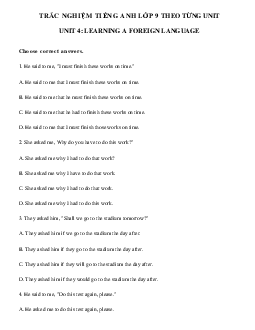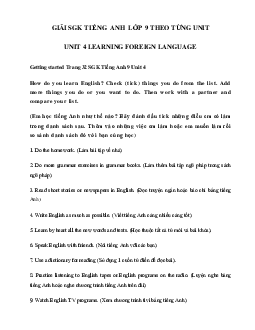










Preview text:
TỪ VỰNG - NGỮ PHÁP TIẾNG ANH LỚP 9
UNIT 4: LEARNING A FOREIGN LANGUAGE
A. Từ vựng Unit 4 lớp 9 Learning A Foreign Language Từ mới
Phân loại/ Phiên âm Định nghĩa 1. learn by heart học thuộc lòng
2. as + adj/ adv + as possible càng ... càng tốt 3. quite = very, completely (adv) /kwaɪt/ rất 4. examiner (n) /ɪɡˈzæmɪnə(r)/ giám khảo 5. examine (v) /ɪɡˈzæmɪn/ tra hỏi, xem xét 6. examination (n) /ɪɡˌzæmɪˈneɪʃn/ kỳ thi 7. go on (v) tiếp tục 8. aspect (n) /ˈæspekt/ khía cạnh
9. in the end = finally, at last cuối cùng 10. exactly (adv) /ɪɡˈzæktli/ chính xác 11. passage (n) /ˈpæsɪdʒ/ đoạn văn 12. attend (v) /əˈtend/ theo học, tham dự 13. attendance (n) /əˈtendəns/ sự tham dự 14. attendant (n) /əˈtendənt/ người tham dự 15. course (n) /kɔːs/ khóa học 16. written examination (n) kỳ thi viết 17. oral examination (n) kỳ thi nói 18. candidate (n) ˈkændɪdət/ thí sinh, ứng cử viên 19. award (v, n) /əˈwɔːd/ thưởng, phần thưởng 20. scholarship (n) /ˈskɒləʃɪp/ học bổng 21. dormitory (n) /ˈdɔːmətri/ ký túc xá 22. campus (n) /ˈkæmpəs/ khuôn viên trường 23. reputation (n) /ˌrepjuˈteɪʃn/ danh tiếng 24. experience (n, v) /ɪkˈspɪəriəns/ kinh nghiệm, trải qua 25. culture (n) /ˈkʌltʃə(r)/ văn hóa 26. cultural (a) /ˈkʌltʃərəl/ thuộc về văn hóa 27. close to gần 28. scenery (n) /ˈsiːnəri/ phong cảnh, cảnh vật 29. national (a) /ˈnæʃnəl/ thuộc về quốc gia 30. nation (n) /ˈneɪʃn/ quốc gia, đất nước 31. national bank (n) ngân hàng nhà nước 32. improve (v) /ɪmˈpruːv/ cải tiến 33. improvement (n) /ɪmˈpruːvmənt/
sự cải tiến, sự cải thiện 34. intermediate (a) /ˌɪntəˈmiːdiət/ trung cấp 35. well-qualified (a) có trình độ cao 36. tuition = fee (n) /tjuˈɪʃn/ học phí 37. academy (n) /əˈkædəmi/ học viện 38. advertisement = ad (n) /ədˈvɜːtɪsmənt/ bài quảng cáo 39. advertise (v) /ˈædvətaɪz/ quảng cáo 40. edition (n) /ɪˈdɪʃn/ lần xuất bản 41. look forward to + V-ing mong đợi
Bài tập vận dụng
Fill in each blank with the correct form of the word in capitals
1. Our school has a lot of ____________ teachers. (qualify)
2. Our must be ____________ when you open that door. (care)
3. We could see some strange ___________ on her face (express)
4. Your English is much better, but there’s still room for ____________. (improve)
5. You should write a letter of _________ to that institute. (inquire)
6. When you take an exam, you are an ____________. (examine)
7. English spelling presents special ____________ for foreign learners. (difficult)
8. The school is performing well, but we recognize the need for further ____________. (improve)
9. Let me introduce you a ____________ university. I think it’s really reliable. (repute)
10. Cigarette ____________ has been banned. (advertise)
11. Previous teaching experience is a necessary ____________ for this job. (qualify) Đáp án
1. Our school has a lot of ____qualified________ teachers. (qualify)
2. Our must be _____careful_______ when you open that door. (care)
3. We could see some strange _____expressions______ on her face (express)
4. Your English is much better, but there’s still room for _____improvement_______. (improve)
5. You should write a letter of _____inquiry____ to that institute. (inquire)
6. When you take an exam, you are an _____examinee_______. (examine)
7. English spelling presents special ______difficulties______ for foreign learners. (difficult)
8. The school is performing well, but we recognize the need for further
_____improvement_______. (improve)
9. Let me introduce you a _____reputable_______ university. I think it’s really reliable. (repute)
10. Cigarette ____advertising________ has been banned. (advertise)
11. Previous teaching experience is a necessary ____qualification________ for this job. (qualify)
Trên đây là toàn bộ từ mới Tiếng Anh có trong Unit 4 chương trình cũ Tiếng Anh lớp 9:
Learning A Foreign Language. Nếu bạn đọc đang theo học Tiếng Anh lớp 9 chương trình
mới, mời bạn đọc tham khảo thêm tài liệu Từ vựng Tiếng Anh Unit 4 sách mới tại đây: Từ
vựng Tiếng Anh lớp 9 Unit 4 Life In The Past .
B. Ngữ pháp Unit 4 lớp 9 Learning a foreign language
I/ Modal verbs with if - Động từ tình thái với mệnh đề If
Cấu trúc: if + present tense modal + verb
Các động từ đặc biệt như là must can should may might ought to have to could...cung cấp
thêm thông tin về kết quả liên quan đến khả năng mức độ chắc chắn sự cho phép nhiệm
vụ/nghĩa vụ hoặc sự cần thiết.
Ex: If you want to drive a car you must have a driving licence. (Nếu bạn muốn lái xe hơi bạn phải có bằng lái xe)
She may accept your offer if you ask her. (Cô ấy có thể sẽ chấp nhận nếu anh hỏi cô ấy)
II/ Reported speech - Câu gián tiếp
1. Cách chuyển đổi từ câu trực tiếp sang câu gián tiếp:
- đổi chủ ngữ tân ngữ tính từ sở hữu trong câu trực tiếp sao cho phù hợp với ngữ cảnh
- thay đổi thì của động từ (lùi thì)
- biến đổi các đại từ chỉ thị trạng từ chỉ thời gian địa điểm. Câu trực tiếp Câu gián tiếp tenses S + am/ is/ are → S + was/ were S + V → S + Ved S + will + V → S + would V S + will be → S + would be S + have P2 → S + had P2
S + are/ is/ am + going to V→ S + was/ were + going to V S + was/ were Ving → S + had been + Ving S + have/ has been Ving → S + had been Ving Must → Had to Have to → Had to
Should.......................... → Should Ought to → Ought to Can → Could May → might time Yesterday
The day before/the previous day Five days ago Five days before/ earlier Last week
The week before/ the previous week Now Then Today That day Tonight That night Tomorrow
The next day/ the following day Next week
The next week/ the following week Ago Before The day before yesterday Two days before The day after tomorrow In two day s time place Here There there there This That these those Personal I He/ she pronouns We They You You/ he/ she They They He/she He/she it it Possessive My His/her pronouns Our Their Your His/her/their Their Their His/ her His/her its its This/ these + N The + N
This / that là đại từ chỉ thị It/ them/ they Ex: people say "We should
People say they should solveit. solvethis"
2. Một số hình thức câu gián tiếp cơ bản
a) Reporting statements (câu trần thuật) "I m very happy." Annie said.
→ Annie said (that) she was very happy. "We like oranges."
→ They said (that) they liked oranges.
Thường sử dụng các động từ tường thuật như: said said to told reported ....
b) Reporting commands and requests
Cấu trúc: S + V (asked/ told ...) + O + to (not to) + V ...
Ex: "Shut the door Tom" he said.
→ He told Tom to shut the door. Cách chuyển đổi:
+ đổi động từ tường thuật sang: told (bảo) asked (yêu cầu ra lệnh) advised (khuyên)
persuaded (thuyết phục) begged (van xin) ...tuỳ theo ngữ cảnh lời nói.
+ tìm tân ngữ đặt ngay sau động từ tường thuật trên
+ bỏ dấu hai chấm ngoặc kép
+ với câu mệnh lênh khẳng định chuyển động từ mệnh lệnh thành To V; với câu mệnh lệnh
phủ định chuyển động từ mệnh lệnh thành Not to V
+ biến đổi thì của động từ đại từ nhân xưng đại từ sở hữu các từ chỉ thời gian sao cho phù hợp với ngữ cảnh
c) Reporting questions (câu h ỏi)
1) Yes/ No questions (câu hỏi có câu trả lời là Có hoặc Không)
She + asked/ wanted to know/ wondered + (O) + if/ whether + mệnh đề
Ex: Mary said to Nam "Can you speak English?"
→ Mary asked Nam if/ whether he could speak English.
"Do you go to school?" he asked
→ He asked if I went to school.
2) Wh - questions (Câu hỏi có từ để hỏi)
S + V + (O) + who/ what ... + Mệnh đề
Ex: Betty said to Jane "What are you doing?"
→ Betty asked Jane what she was doing.
"When did your sister leave for Danang?" asked Tina.
→ Tina asked me when my sister had left for Danang. 3. Chú ý
- khi động từ tường thuật ở các thi hiện tại hoặc tương lai các thì cảu động từ trong câu trực
tiếp không đổi các từ chỉ thời gian và nơi chốn vẫn giữ nguyên
She says "Tim won the scholarship last week."
→ She says Tim won the scholarship last week.
- khi lời nói trực tiếp diễn tả một chân lý sự kiện hiển nhiên định luật khoa học động từ của
lời nói trực tiếp không đổi thì
He said "Ice melts in the sun."
→ He said (that) ice melts in the sun.
Bài tập vận dụng
Put the following sentences into reported speech
1. “If you want to learn English, I can help you” John said.
__________________________________________________
2. “Where are you studying?” Mr. Bruce asked.
__________________________________________________
3. “Please call me at 6 o’clock tomorrow morning,” said Mai
__________________________________________________
4. “Are you interested in this Language Center?” asked Lan
__________________________________________________
5. “We will spend our holiday in Da Lat next month,” said Mrs. Chi
__________________________________________________
6. “You should check your work before you hand it in” she said to me
She advised ________________________________________ before handing it in.
7. “Why are you writing in pencil?” he asked me
He wondered _______________________________________ in pen.
8. “Phone him tomorrow,” she said to me on Saturday.
She told me ________________________________________
9. “What time does the film begin?” she asked me
She wanted to know when _____________________________
10. “Go to bed and don’t get up till you’re called”
She asked him _______________________________________ Đáp án
1. John told me that if I wanted to learn English, he could help me.
2. Mr. Bruce asked me where I was studying.
3. Mai told me to call her at 6 o’clock the following/ next morning.
4. Lan asked me if/ whether I was interested in that Language Center.
5. Mrs. Chi said that they would spend their holiday in Da Lat the following/ next month.
6. She advised me to check my work before handing it in.
7. He wondered why I was not writing in pen.
8. She told me to ring him on Sunday.
9. She wanted to know when the film began.
10. She asked him to go to bed and not to get up till he was called.




